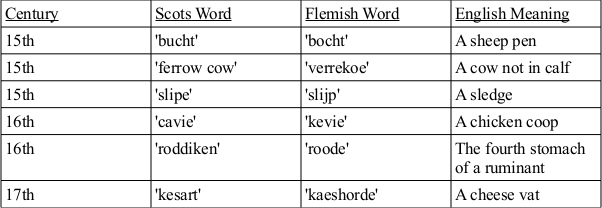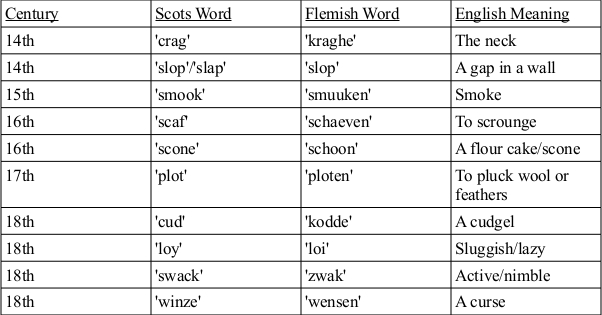The Flemish Influence on Scottish Language
The Scottish relationship with Flanders — whether through trade, immigration or other forms of interaction — has led, among other things, to a significant impact of the Flemish tongue on the development of the Scottish language. Today’s blog posting, mainly the work of Chris Robinson, examines this linguistic influence.
The links between Scotland and the Flemish people, in its various dimensions, have been the subject of this blog series over the last eight months and they are also the focus of ongoing research at the St. Andrews Institute of Scottish Historical Research. Suffice to say here that the relationship between the two peoples has been sufficiently deep and lasting, commencing from as early as the 12th century, that there has been a linguistic influence at play running from the Flemish language to the Scots.
The two languages are closely related, which made borrowing very easy. In her History of Scots to 1700, Caroline Macafee[[1]] tells us that the Clyde valley was systematically feudalised by Malcolm IV in the mid-12th century and a colony of Flemings was planted, as evidenced in the place-names Thankerton, Wiston, Lamington and Symington. Such settlement by craftsmen was actively encouraged up until the 16th century.
The establishment of the early Scottish burghs was an important factor in the development of the Scots language. To the linguistic mix of Norse-influenced Northern Middle English, French and Gaelic, Flemish speakers added a substantial number of words. Macafee[[1]] cites guild and kirkmaister as examples of how their linguistic influence was reflected in burghal terminology. She also points out how they would have added their weight to the restoration of non-palatalised forms of words like kirk which in English became church. Old Norse is usually given as the source of these non-palatalised forms, but, as often happens, more than one influence was at work and Flemish had a supporting role.
The Flemish tongue is essentially a form of Dutch and this leads, in terms of linguistic analysis, to a difficulty in isolating the influence of the Flemish people and their language on Scots from that of the Dutch. Attempts have been made to disentangle the relative impacts of these two people groups. In the process of compiling A Dictionary of the Older Scottish Tongue and the Scottish National Dictionary — now available as the online Dictionary of the Scots Language (www.dsl.ac.uk)[[2]] — a huge body of data on the Scots language has been brought together. From this data, David Murison[[3]], editor of the Scottish National Dictionary from 1946-76, did sterling work on extracting and analysing the influence of Dutch and Flemish.
The Flemish influence on the Scots language is felt particularly in fields where there were significant areas of contact. As might be expected, the two most important were areas pertaining to trade and cloth. But there were a number of other areas worthy of note: agriculture, weights and measures, coinage, games, war and weapons. There is also a miscellaneous set of other Flemish-rooted words that have embedded themselves in Scots. Murison’s[[3]] work is noteworthy in that it makes a distinction between the Flemish linguistic influence in the 14th, 15th, 16th, 17th and 18th centuries. The tables below have been extracted from Murison’s work.
The words in these tables do not include Flemish rooted words that made their way into both the English and Scots vocabulary. The focus here is solely on the impact on the Scots language.
The heyday of the economic relationship between Scotland and Flanders was the 14th and 15th century, so it is not surprising that many of the words pertaining to trade and cloth date to this period. By the same token the more troubled 16th century saw the transmission to Scotland of Flemish words relating to war and weapons.
In the earlier period the transmission mechanism was primarily through Flemish traders and immigrant Flemish weavers domiciled in Scotland. In the later period the influence may have come through Scottish mercenaries fighting in Northern Europe and bringing words back to Scotland.
There are major difficulties in separating out the influences of the Germanic languages on Scots. The Scandinavian languages, Low German, Dutch, and Flemish, have all played their parts, and it is not always clear whether a Scots word comes from one or more of these languages or whether it was there in Old English from the start. Too often the answer is a definite ‘don’t know’. However, the work of Murison[[3]] in separating out words of Flemish origin and relating them to their semantic fields and date of borrowing can help to focus the range of possibilities for the etymologist. Through their words, he brings to life the speakers and their daily business and demonstrates in parallel the economic and linguistic contribution of Flemings to Scotland.
Chris Robinson and Alex Fleming
Chris Robinson is the current Director of Scottish Language Dictionaries and guest lecturer at the University of the Highlands and Islands. She also teaches postgraduates at the University of Edinburgh.
References
[1] Macafee, Caroline (2005) The History of Scots to 1700 in Dictionary of the Scots Language. 2004. Scottish Language Dictionaries Ltd. http://www.dsl.ac.uk
[2] Dictionary of the Scots Language. 2004. Scottish Language Dictionaries Ltd. http://www.dsl.ac.uk
[3] Murison, David. “The Dutch element in the vocabulary of the Scots” in Edinburgh Studies in English and Scots, ed. A. J. Aitken, A. McIntosh,and H. Palsson (London, Longman, 1971).







